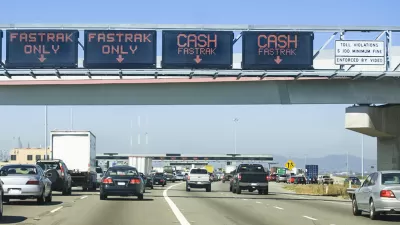Oil prices are at a five-year low with gasoline prices averaging $2.67 a gallon, lowest since February 2010. Furthermore, they are expected to drop another 17 cents to $2.50 a gallon in time for Christmas, so why not raise the gas tax by a nickel?
The new 114th Congress must deal with the $100 billion question when it convenes in January: how to fund the nation's roads and transit. They face a May 31 deadline because funding for the Highway Trust Fund expires when the current patch bill that relies on "pension smoothing," clearly an unsustainable source of revenue, terminates.
"The obvious answer—the only answer, according to many in Washington—is to raise the 18.4 cent-per-gallon gas tax, which hasn't gone up in more than 20 years," writes Russell Berman of The Atlantic.
Yet even with prices at a four-year low, the odds of Congress touching the gas tax are as long as ever. "I think it’s too toxic and continues to be too toxic," said Steve LaTourette, the former Republican congressman best known for his close friendship with his fellow Ohioan, Speaker John Boehner. "I see no political will to get this done." [More from Boehner below.]
Berman gets a more optimistic scenario on the influence of falling gas prices from Rep. Tom Petri of Wisconsin, the new Republican co-sponsor of Rep. Earl Blumenauer's UPDATE Act that increases gas taxes a nickel a year for three year, and then indexes the tax to inflation.
"I don’t think there’s any question that it’s going to change the dynamics and make it much more palatable," he said. But he warned of a lag between the politics and the market. "It sometimes takes a little while for institutions to adjust to changes in the real world. So it may not happen instantly."
Significantly, as we noted earlier, Petri won't be in Congress to fight for his bill—he's retiring.
Unfortunately for Petri and other advocates of increasing the 18.4 cent gas tax, it appears they will not be able to expect any help from President Barack Obama. In fact, they may encounter opposition. Heather Caygle writes in Politico Morning Transportation about a meeting the president held on Dec. 3 with top business executives.
When asked by FedEx CEO Fred Smith why the White House doesn't get together with Congress and push for a gas tax hike in the lame duck, the president didn't sound too hopeful. "So the gas tax hasn't been increased for 20 years. There's a reason for that," he said. "In fairness to members of Congress, votes on gas taxes are really tough. Gas prices are one of those things that really bug people."
He said it may be time to stop looking to the gas tax as the savior of the Highway Trust Fund and instead find an alternate revenue source that "is not so politically frightening" to lawmakers. [Listen to the story here on NPR].
The president would fund his $302 billion infrastructure plan, known as the Grow America Act, not with a user fee but by "supplementing current revenues with $150 billion in one-time transition revenue from pro-growth business tax reform" as we noted last February. The revenue would be transferred from the general fund to the Highway Trust Fund, a subsidization pattern that has been a fixture for federal transportation funding since 2008 when the trust fund became insolvent.
[Note: some gas tax critics do not consider the gas tax a user fee.]
Speaker Boehner may be sympathetic to using business tax reform as the funding mechanism for a short term bill according to an earlier post. Berman uses a more specific term to denote just what kind of tax reform leaders have in mind: "repatriated corporate profits."
Berman sums up the prevalent attitude in Congress and the White House, "It's just one more frustrating example of a political culture paralyzed by fear of the voters' wrath, whether imagined or real."
Meanwhile, gas prices continue to plummet, and many infrastructure advocates must be asking themselves, if gas prices drop 17-cents this month alone to $2.50 a gallon, would anyone even notice a nickel increase in the gas tax?
FULL STORY: The Tax That Dare Not Be Hiked

Alabama: Trump Terminates Settlements for Black Communities Harmed By Raw Sewage
Trump deemed the landmark civil rights agreement “illegal DEI and environmental justice policy.”

Study: Maui’s Plan to Convert Vacation Rentals to Long-Term Housing Could Cause Nearly $1 Billion Economic Loss
The plan would reduce visitor accommodation by 25% resulting in 1,900 jobs lost.

Planetizen Federal Action Tracker
A weekly monitor of how Trump’s orders and actions are impacting planners and planning in America.

Wind Energy on the Rise Despite Federal Policy Reversal
The Trump administration is revoking federal support for renewable energy, but demand for new projects continues unabated.

Passengers Flock to Caltrain After Electrification
The new electric trains are running faster and more reliably, leading to strong ridership growth on the Bay Area rail system.

Texas Churches Rally Behind ‘Yes in God’s Back Yard’ Legislation
Religious leaders want the state to reduce zoning regulations to streamline leasing church-owned land to housing developers.
Urban Design for Planners 1: Software Tools
This six-course series explores essential urban design concepts using open source software and equips planners with the tools they need to participate fully in the urban design process.
Planning for Universal Design
Learn the tools for implementing Universal Design in planning regulations.
Caltrans
Smith Gee Studio
Institute for Housing and Urban Development Studies (IHS)
City of Grandview
Harvard GSD Executive Education
Toledo-Lucas County Plan Commissions
Salt Lake City
NYU Wagner Graduate School of Public Service



























